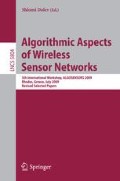Abstract
Sensor networks, with their ad hoc deployments, node mobility, and wireless communication, pose serious challenges for developing provably correct and efficient applications. A popular algorithm design technique for such systems is link reversal, first proposed by Gafni and Bertsekas [1] for routing, and subsequently employed in algorithms for, e.g., partition-tolerant routing [2], mutual exclusion [3] , and leader election [4,5,6]. Gafni and Bertsekas [1] considered the problem of assigning virtual directions to network links to ensure that the network is loop-free and that every node in the network has a (directed) path to a destination node. They proposed two algorithms, full reversal (FR) and partial reversal (PR), together with an implementation of each based on associating an unbounded value with each node in the graph.
In this paper, we consider a generalization, called \({\mathcal LR}\), of these two algorithms, which was proposed and analyzed in a previous paper [7]. The key to the generalization is to associate a binary label with each link of the graph instead of an unbounded label with each node. In the \({\mathcal LR}\) formalism, initial labelings form a continuum with FR and PR at opposite ends. We previously showed that the number of steps a node takes until convergence—that is, the cost associated to a node—depends only on the initial labeling of the graph. In this paper, we compare the work complexity of labelings in which all incoming links of a given node i are labeled with the same binary value μ i . Finding initial labelings that induce good work complexity can be considered as a game in which to each node i a player is associated who has strategy μ i . In this game, one tries to minimize the cost, i.e., the work complexity. Expressing the initial labelings in a natural way as a game allows us to compare the work complexity of FR and PR in a way that, for the first time, provides a rigorous basis for the intuition that PR is better than FR .
Access this chapter
Tax calculation will be finalised at checkout
Purchases are for personal use only
Preview
Unable to display preview. Download preview PDF.
References
Gafni, E.M., Bertsekas, D.P.: Distributed algorithms for generating loop-free routes in networks with frequently changing topology. IEEE Transactions on Communications 29, 11–18 (1981)
Park, V.D., Corson, M.S.: A highly adaptive distributed routing algorithm for mobile wireless networks. In: IEEE Infocom 1997 - 16th Conference on Computer Communications, pp. 1405–1413. IEEE, Los Alamitos (1997)
Walter, J.E., Welch, J.L., Vaidya, N.H.: A mutual exclusion algorithm for ad hoc mobile networks. Wireless Networks 7, 585–600 (2001)
Malpani, N., Welch, J.L., Vaidya, N.: Leader Election Algorithms for Mobile Ad Hoc Networks. In: Proceedings of the 4th international workshop on Discrete algorithms and methods for mobile computing and communication (2000)
Ingram, R., Shields, P., Walter, J.E., Welch, J.L.: An asynchronous leader election algorithm for dynamic networks. In: Proc. of the IEEE International Parallel & Distributed Processing Symposium (to appear, 2009)
Derhab, A., Badache, N.: A self-stabilizing leader election algorithm in highly dynamic ad hoc mobile networks. IEEE Trans. Parallel Distrib. Syst. 19, 926–939 (2008)
Charron-Bost, B., Gaillard, A., Welch, J.L., Widder, J.: Routing without ordering. In: Proceedings of the 21st ACM Symposium on Parallelism in Algorithms and Architectures, SPAA (to appear, 2009)
Busch, C., Surapaneni, S., Tirthapura, S.: Analysis of link reversal routing algorithms for mobile ad hoc networks. In: Proceedings of the 15th ACM Symposium on Parallelism in Algorithms and Architectures (SPAA), pp. 210–219 (2003)
Busch, C., Tirthapura, S.: Analysis of link reversal routing algorithms. SIAM Journal on Computing 35, 305–326 (2005)
Koutsoupias, E., Papadimitriou, C.H.: Worst-case equilibria. In: 16th Annual Symposium on Theoretical Aspects of Computer Science (STACS), pp. 404–413 (1999)
Nash, J.: Non-cooperative games. The Annals of Mathematics 54, 286–295 (1951)
Osborne, M.J.: An Introduction to Game Theory. Oxford University Press, Oxford (2003)
Nisan, N., Roughgarden, T., Tardos, E., Vazirani, V.V. (eds.): Algorithmic Game Theory. Cambridge University Press, Cambridge (2007)
Monderer, D., Shapley, L.S.: Potential games. Games and Economic Behavior 14, 124–143 (1996)
Halpern, J.Y.: Beyond Nash equilibrium: solution concepts for the 21st century. In: Twenty-Seventh Annual ACM Symposium on Principles of Distributed Computing (PODC), pp. 1–10 (2008)
Author information
Authors and Affiliations
Editor information
Editors and Affiliations
Rights and permissions
Copyright information
© 2009 Springer-Verlag Berlin Heidelberg
About this paper
Cite this paper
Charron-Bost, B., Welch, J.L., Widder, J. (2009). Link Reversal: How to Play Better to Work Less. In: Dolev, S. (eds) Algorithmic Aspects of Wireless Sensor Networks. ALGOSENSORS 2009. Lecture Notes in Computer Science, vol 5804. Springer, Berlin, Heidelberg. https://doi.org/10.1007/978-3-642-05434-1_10
Download citation
DOI: https://doi.org/10.1007/978-3-642-05434-1_10
Publisher Name: Springer, Berlin, Heidelberg
Print ISBN: 978-3-642-05433-4
Online ISBN: 978-3-642-05434-1
eBook Packages: Computer ScienceComputer Science (R0)

